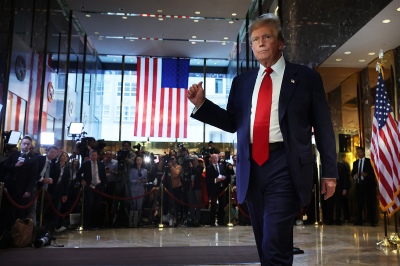Trump's guilty verdict proves either these 2 things
Many of you will remember from somewhere in your educational past hearing, in either a history or civics class, Benjamin Franklin’s definition of the new form of government the Constitutional Convention had just approved.

Upon announcement of the Constitutional Convention’s approval of a Constitution, Elizabeth Willing Powell asked, “Well, Doctor, what have we got, a republic or a monarchy?”
Franklin’s reply, “A republic, if you can keep it.”
Franklin’s reply is important because that is precisely what the Constitution proposed, a republic, not a democracy. Far too often we discuss our government and we use “democracy” and “republic” as virtual synonyms and they are not.
A democracy is a form of government where at specific intervals the population votes to elect its leaders and the majority rules with little provision made for the rights of minorities. In a democracy you always have the inherent danger of the “tyranny of the majority.”
In a constitutional republic, which the United States is, you have government under the rule of law, the law having been implemented by a majority vote, but with legal protections for those in the minority. Even if someone finds themselves in the minority in public opinion, they still have the right to freedom of speech, of assembly, of religion, and peaceful redress of grievances. In other words, in a republic the law places limitations on the ability of majorities to suppress the rights of those holding a minority viewpoint.
When one reads the U.S. Constitution’s Bill of Rights (the first ten amendments to the U.S. Constitution, known as the “Bill of Rights,” ratified together in 1791), one understands that every individual has certain “unalienable” rights, whether they are in the minority or not.
The goal in a constitutional republic is a basic core of human rights embodied or codified in a corpus of laws. In other words, the citizens of a republic have equality under the law.
Of course, the ideal has not always been fully realized. In the United States ethnic minorities and for much of American history, women as well, have not fully enjoyed equality under the law. In recent generations America has made enormous strides in correcting these injustices toward both ethnic minorities and women. Unfortunately, the U.S. has still some way to go in ensuring equality under the law for the financially insecure.
However, national commitment to, and achievement of, equality under the law is cherished by a large percentage of Americans across all ethnic and class boundaries. In many ways, it is the glue that holds our increasingly diverse society together.
Many people have been surprised at the American public’s response to Donald Trump’s trial and conviction in New York. Millions of Americans were scandalized by the numerous ways in which former President Trump’s constitutional rights were ignored and violated. First, you had a candidate for Manhattan District Attorney, Alvin Bragg, campaigning on the platform of “getting” former President Trump, then, having won election, delivering on his promise. In order to do so, D.A. Alvin Bragg took a state misdemeanor of falsifying business records, “turned it into a felony by usurping the federal government prerogatives and prosecuting what he called a federal campaign finance violation. The case’s convoluted construction has led many voters to see the prosecution as politically motivated”.
The outrageous behavior of the trial judge, including his instructions to the jury that they did not need a unanimous verdict, amplified the opinion that this was a political kangaroo court.
A significant number of Americans have come to the conclusion that the Biden Administration has weaponized the judicial system in an attempt to disqualify Mr. Trump from running for President. The backlash by the American people has been pleasingly significant. If the judge imposes any restrictions on former President Trump’s ability to campaign in his sentencing of Mr. Trump, the backlash will only increase.
Any such restrictions on former President Trump should also force the U.S. Supreme Court to intervene since you have a state court interfering with a federal election process, which is clearly unconstitutional and should not be tolerated.
Mr. Trump’s opponents’ behavior has proven one of two things: either Trump Derangement Syndrome is real and they have taken leave of their senses, or they really believe they can subvert the rule of law and the American people won’t notice or care.
The huge rush in small contributions to former President Trump’s campaign in the aftermath of the New York verdict indicates that the American people have noticed and they are in no mood to tolerate it any longer.
Dr. Richard Land, BA (Princeton, magna cum laude); D.Phil. (Oxford); Th.M (New Orleans Seminary). Dr. Land served as President of Southern Evangelical Seminary from July 2013 until July 2021. Upon his retirement, he was honored as President Emeritus and he continues to serve as an Adjunct Professor of Theology & Ethics. Dr. Land previously served as President of the Southern Baptist Convention's Ethics & Religious Liberty Commission (1988-2013) where he was also honored as President Emeritus upon his retirement. Dr. Land has also served as an Executive Editor and columnist for The Christian Post since 2011.
Dr. Land explores many timely and critical topics in his daily radio feature, “Bringing Every Thought Captive,” and in his weekly column for CP.





















